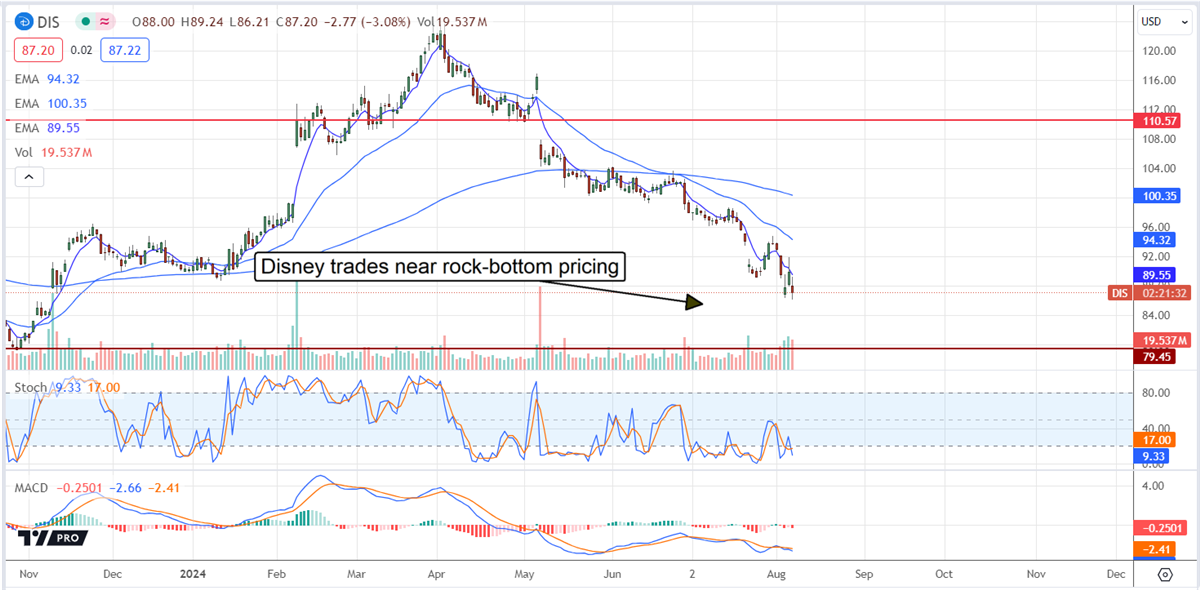
The Walt Disney Company’s (NYSE: DIS) Q3 results and guidance are solid, leaving many questioning why the stock remains under pressure. The primary reason is a caution that economic pressures will continue to impact demand at the parks. This is critical information because the parks account for more than 35% of revenue, so a small shift will make a big difference. However, the takeaways for investors are that Experiences segment revenue is growing, Entertainment is outperforming, and margins are widening. Because margins and growth drove Mr. Iger’s return to the House of Mouse and share prices are back to historical lows, it looks like a good time to get in.
Expected weakness in the parks should not be overlooked but, in hindsight, will likely be a brick in a wall of worry. Inflation and high interest rates are the culprits, but inflation is cooling, and interest rates are expected to fall. Because the latest NFP data was tepid, the first FOMC interest rate cuts could be aggressive but will ease the headwind for discretionary stocks regardless of their size. Until then, the Experiences segment trends aren’t worsening; growth is present but not as robust as the broad market would like.
Disney Has a Good Quarter and Raises Guidance
Disney had a good quarter despite the tepid response to guidance. The company reported $23.16 billion in revenue for a gain of 3.7%, which outpaces consensus and shows the value of Mr. Iger’s return and the strength of portfolio diversification. The 3.7% gain was primarily driven by a 4% increase in Entertainment, which was, in turn, driven by strength in four of the five reported streaming segments. Systemwide growth was compounded by a 5% gain in Sports, the smallest segment by far, and a 2% gain in Experiences.
The best news in the report is the margin. The company widened its operating margin significantly on cost-control efforts and spending discipline, compounded by sooner-than-expected profitability in streaming. The streaming segment reached profitability a full quarter ahead of expectations and is forecasted to improve sequentially in Q4. The net result is a 19% increase in operating income, GAAP profits versus losses, and a 35% increase in adjusted earnings. The adjusted $1.39 beat by 1700 basis points and led management to raise guidance, another critical detail for investors.
Disney maintained its revenue guidance but raised its target for earnings by 500 basis points to 30%. The improved margin is also expected to drive about $8 billion in free cash flow, more than double last year's. Last year’s FCF was up 100%—more evidence that the Iger-led turnaround is gaining traction.
Disney Capital Returns Grow, Add Value to Your Investments
The Iger-led turnaround includes a return to capital returns that his predecessor halted. Capital returns include the dividend and share repurchases, which amounted to more than $3 billion in Q3. The diluted share count is still up for the nine months, but that detail will likely change by the year’s end; the Q3 share reduction was nearly 0.4%, and the nine-month total is only up by 0.1%. Dividends are worth about 1.0%, with shares near the long-term low, and distribution is expected to grow over time. Balance sheet highlights include a 60% cash reduction due to investments, dividends, and repurchases, leading to a decrease in current and total assets offset by debt reduction and a 1.5% increase in equity.
Disney Stock is Near Rock Bottom Pricing
Disney shares are trading near rock-bottom pricing at 16x next year’s earnings and the low end of a 10-year trading range. As tepid as the growth is, business is growing well above the 2014 levels. Analysts also see a deep value in this stock, setting a target range of $100 to $145 or about 15% upside at the low and 45% at the consensus midpoint. Price action may retreat to the $80 level, but it is not expected to fall through it. Instead, it will produce a strong entry signal if reached. 




